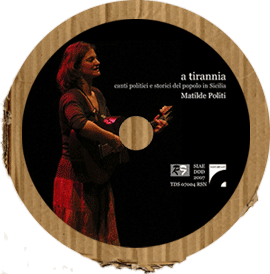

  |
| brano |
durata |
ascolta |
|
| 1. A Tirannia |
3' 5'' |
 |
|
| 2. Vespiru |
2' 26'' |
 |
|
| 3. Sarvaturi Casimiru |
1' 45'' |
 |
|
| 4. Vespiru #2 |
2' 01'' |
 |
|
| 5. Sbirruni |
2' 20'' |
 |
|
| 6. Vespiru #3 |
1' 13'' |
 |
|
| 7. I pirati a Palermu |
4' 42'' |
 |
|
| 8. Vespiru #4 |
2' 02'' |
 |
|
| 9. Surfarara nissena |
3' 39'' |
 |
|
| 10. Mommu Brunu |
5' 38'' |
 |
|
| 11. Chiddu chi manca |
1' 48'' |
 |
|
| 12. La finuta di li Barboni |
5' 02'' |
 |
|
| 13. La Sicilia havi un patruni |
3' 30'' |
 |
|
| 14. Giuliano #1, il separatismo |
3' 13'' |
 |
|
| 15. Giuliano #2, Portella della Ginestra |
2' 04'' |
 |
|
| 16. Sant'Agata |
2' 15'' |
 |
|
| 17. Lu suli spunta prestu |
2' 05'' |
 |
|
| 18. Lamentu pi Turiddu Carnivali |
10' 18'' |
 |
|
| 19. Guvernu 'talianu |
2' 52'' |
 |
|
|
Anthology of traditional songs, speaking about society and politics in Sicily
between thirteenth and twentieth centuries.
Project, research, arrangements, production, by Matilde Politi.
Voice and guitar - Matilde Politi
Featuring also: Massimo La Guardia (frame drums), Lajos Zsivkov (jew's harp),
Lelio Giannetto (double bass)
Released in 2007, Teatro del Sole, Palermo (Italy)
“In the history of Sicily, the people have chosen different strategies to
survive while mainteining the dignity.
In some moments the strategy was fighting together against the stranger
oppressor, like in the Vespro revolt, in 1282; in others the choice was going up
in the mountains becoming bandits, us the only way to rebel oneself to the
submission to iniquitous laws.
In some cases the strategy was tenaciously standing the inhuman conditions of
working in the mines or in the fields; in others the choice was coragiously
taking up all together, to occupy the fields that should be divided among the
poor workers.
From the enthusiasm for Garibaldi’s wishes to unify the State of Italy, to the
delusion of all the difficulties born from the unity, and then the desire of
independence, and the second world war with the final arrival of the Americans,
like the umpteenth stranger...
The testimonies arrived through oral tradition, in the people language, of all
these moments, can be listened like a single cantata, that shows how, in some
way, at least a part of the people have always
proudly reacted, with determination, to every kind of tyranny, and they will
always react.
Dedicated to all the women and the men that don’t bend the head under the
tyranny, of any kind.
Dedicated to the mothers, strong and tenacious, that even after seeing their
sons killed by the mafia,
keep on bearing, head-high, the flag of the downtrodden people.”
(from the inside booklet; all songs lyrics in Sicilian dialect and Italian
traslation)